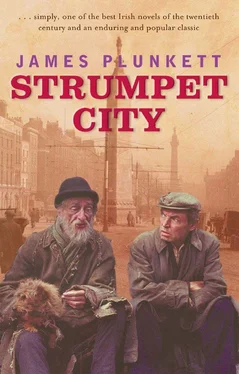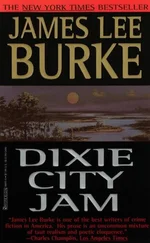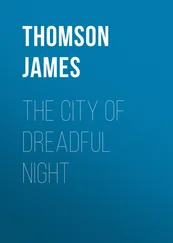‘Sharp weather,’ he said as he asked for it.
‘It’s healthy,’ the publican said.
‘Better than the rain,’ a customer put in.
‘Invigorating,’ the publican agreed.
Hennessy removed the drop from his nose and wondered if the publican would be as enthusiastic if he had to be out in it. But the golden colour in his glass and the steam rising from it mollified him.
‘Here’s the first today,’ he said, raising the glass in salute.
‘ Sláinte ,’ the publican returned.
The other customer approved.
‘That’s what I like to hear,’ he told Hennessy, ‘an Irishman using his native language—matteradam whether he knows much or little of it.’
‘I know damn all about it,’ the publican confessed honestly, ‘except that sláinte bit and Conus Tawtoo. And—oh yes—slawn lath.’
‘There you are,’ said the customer encouragingly, ‘you know a fair bit just the same.’
‘If I had to confess my sins in it,’ said the publican, ‘I’d stay unshriven.’
He was a man who refused to be flattered.
‘Are you an exponent yourself, sir?’ Hennessy enquired, adopting a tone of gentility in deference to the other’s air of education and good manners.
‘In a modest way,’ the other confessed, ‘I’ve attended classes.’
‘At mass this morning the sermon was in Irish,’ Hennessy told them. ‘It was a grand thing to hear.’
‘And did you understand it?’ the publican asked.
‘Well—no,’ Hennessy admitted.
‘I fail to see the sense in that,’ the publican decided. He was counting empty bottles into a crate.
‘In honour of the National Apostle,’ Hennessy explained.
‘And did St. Patrick speak Irish?’
‘Fluently,’ the customer said.
‘I didn’t know that, mind you,’ the publican admitted.
‘Irish and Latin,’ Hennessy confirmed.
‘Latin, naturally,’ the customer agreed, ‘it was the language of the Universal Church.’
‘If he didn’t know Irish,’ said Hennessy, pressing his point, ‘how could he have explained our holy religion to the Irish princes and chiefs. There wasn’t one of them knew a word of English.’
‘French,’ the customer corrected.
‘I beg your pardon?’
‘French,’ the customer repeated, ‘St. Patrick’s native language was French.’
‘Well—French then,’ Hennessy amended. ‘I doubt any of the Irish princes spoke French.’
‘To be fair now,’ said the customer, ‘some of them might have. There was a lot of trade with the Continent, if you remember.’
‘That’s true,’ Hennessy said, with an educated nod.
The publican hoisted the full crate on to the counter and exclaimed blasphemously as he jammed his thumb in the process. Then he apologised and said:
‘That’s one kind of language the Saint wouldn’t know, I’ll warrant.’
‘I wouldn’t be so sure,’ the customer said, ‘he could be crusty enough.’
‘Giving out oul lip to God at times, I believe,’ Hennessy said.
‘That’s true. When he was fasting up there on Croagh Patrick and wrestling with the devil. He hammered hard at God to get the privilege from him of being allowed to be the judge of the race of the Gael on the Last Day.’
‘He got that promise—I understand,’ Hennessy said.
‘I take a lot of that stuff with a grain of salt,’ the publican told them. He was cooling his bruised thumb under the counter tap.
‘Ah well,’ Hennessy said, ‘whoever it is does the judging, I hope he won’t be too hard on any of us.’
‘Right enough,’ the publican said, relenting, ‘the only difference between any of us is that if one of us is bad, the other is a damn sight worse.’
‘Amen to that,’ said the customer.
They had another in honour of the day that was in it, the publican, despite initial reservations about the earliness of the hour at length consenting in deference to the demands of true patriotism, to join them. They toasted the cause of Ireland which was Holy and their kin both at home and in exile. They then shook hands and said slan leat several times and went their various ways.
Hennessy was a little light in the head. He was also very happy. He liked things going on about him and welcomed the holiday bustle in the streets. The public buildings were gay with flags, men and women wore their sprays of shamrock pinned to their coats or pushed jauntily into their hat bands. The little girls had green ribbons in their hair, the small boys wore harps and St. Patrick badges on their jerseys. He was glad he had got mass on his way from his night work and that he had the foresight to bring something in with him so that he could have his breakfast on the job. It left him free to enjoy the celebrations without the inconvenience of feeling hungry. Later he would arrive home with little gifts to distribute. For the moment the church bells and the traffic and the sounds of parading bands were blending together in a wave of welcome excitement. It was Ireland’s Great Day.
As the bell of St. Brigid’s boomed across the forecourt to summon its shamrock bedecked parishioners to last mass, Father O’Sullivan pushed open the door of the common room. He found Father O’Connor waiting for him. The fire was blazing away satisfactorily, the great centre table was set for lunch. They would dine later than usual today in order to accommodate their guest, the Reverend Father Ernst Boehm of the Society of Jesus, who had consented to lead the rosary and deliver the sermon in Irish at afternoon devotions. He was, they understood, a Gaelic scholar of distinction.
The housekeeper seemed to have done very well. The napkins were tastefully arranged, a dish of shamrock made a pleasant display of green against the white tablecloth.
‘Mrs. O’Gorman has excelled herself—don’t you think?’ Father O’Sullivan remarked. As senior curate he was responsible for parish affairs in Father Giffley’s absence. The entertainment of so important a guest caused him anxiety.
‘She has forgotten the finger-bowl,’ Father O’Connor said.
‘The finger-bowl?’ Father O’Sullivan repeated. He surveyed, inexpertly, the layout of the table.
‘Thank goodness you noticed,’ he said, ‘we can have that put right.’
‘Without difficulty,’ Father O’Connor assured him. His manner was grim.
‘I have been wondering what we should offer him. Beforehand—I mean. Whiskey, do you think?’
‘Sherry would be better.’
‘Sherry, of course. I’m the world’s worst at this sort of thing . . . Have we got any?’
‘I saw to it.’
‘Grand. I’m glad you thought of that.’
‘I also took the liberty of ordering some wine. For the meal. I felt you would agree.’
‘Of course. That was very farseeing. These S.J.s . . . Besides, he’s a Continental, isn’t he?’
‘German.’
‘Boehm. Yes, indeed. Thank God you thought of the wine. We’d be put to shame altogether.’
Father O’Sullivan rubbed his hands together and chuckled at his thoughts.
‘Do you know,’ he said, ‘it’s comical when you come to think of it. When we need someone who is able to preach in Irish on the feast of our National Apostle, we have to ask a German.’
He noticed that Father O’Connor declined to be amused.
‘Is there something amiss, Father?’ he asked, his anxiety returning.
‘With great respect,’ Father O’Connor said grimly, ‘I think there is.’
He turned and stared at the notice on the wall. It still hung to the right of the enormous painting of the Crucifixion, its bold red letters and its improvised air clashing with the heavy respectability of the rest of the room. It had no place there above the upholstered armchairs, the hospitable fire, the great breadth of the tastefully laid table. The cardboard had warped and yellowed but the message was still large and legible:
Читать дальше












